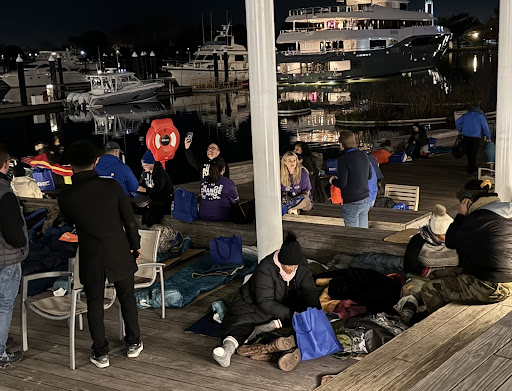Four D.C.-area nonprofits — Friendship Place, House of Ruth, Housing Up, and the National Center for Children and Families — announced in December that they received one-time grants of $2.5 million each from the Bezos Day 1 Families Fund.
According to Tonia Wellons, CEO of the Greater Washington Community Foundation, Amazon and its associated charities are becoming important players in the region’s philanthropy through grants like this. $2.5 million is as much money as some of the Community Foundation’s partner charities give out in total in a given year, and that sum could be “transformative” for a nonprofit, she said.
[Disclosure: Street Sense Media receives some funding via the Greater Washington Community Foundation]
Sheryl Chapman, executive director of the National Center for Children and Families (NCCF), spoke excitedly about the places her organization looks to expand with the grant. NCCF operates the Greentree Shelter, the largest emergency family shelter in Montgomery County, Maryland, and Chapman hopes to use the funding to cut the average length of a stay in the shelter down from the current 63 days.
She also noted that despite its reputation for affluence, there are still many pockets of poverty in Montgomery County, and many of the young families NCCF serves prefer to exhaust all other options before seeking outside help. She wants to use the grant money to launch a new program to closely monitor young families and understand why they don’t turn to other diversionary programs before resorting to the emergency shelter. Overall, the grant is “enough money to shift and do something very humane,” Chapman said.
Friendship Place will use the funds to focus on its core activity: getting families into permanent housing, according to Jean-Michel Giraud, president and CEO of the organization. They hope to add features to the existing program at the Brooks, their short-term family housing facility, like added employment supports and therapeutic services to handle the trauma of falling into homelessness. These kinds of services are things Friendship Place had aspired to offer but were not covered by the existing government contract to run the Brooks.

Giraud added that although the grant was not designed to go out during the COVID-19 pandemic specifically, the timing was perfect. He said he expected a rise in homelessness by as much as 45% due to the pandemic and a growing need for Friendship Place’s services. In May, Columbia University economics professor Brendan O’Flaherty developed a model predicting homelessness in the United States could increase by as much as 45% percent due to the coronavirus pandemic. In December, O’Flaherty’s model predicted a 6% -7% increase in homelessness in D.C., which he said is due to the already high rate of homelessness in the District.
Sandra Jackson, executive director of House of Ruth, a provider of supportive housing, child development services and a support center for survivors of domestic violence, said her organization is going to use the money as the first step towards a total of $20-25 million they hope to raise to build 100-120 units of supportive housing. House of Ruth is already looking at a couple of properties to buy for that project, she said.
The grant will also enable Housing Up, a D.C. nonprofit housing developer, to continue creating units of affordable housing. Since 2010 the organization has developed 372 units of housing for tenants making less than 60% of the area median income with an additional 290 units on the way. The money will also go to a variety of support services they offer, like case management, assistance finding and leasing housing, and a youth tutoring program.
“As the families we serve approach another challenging year, this generosity from the Day 1 Families Fund comes at a pivotal time,” said Phil Hecht, president and CEO of the organization, in a press release. “Our goal is to build diverse, equitable and thriving communities in D.C.; this award allows us to take major steps to reaching that goal.”
The Bezos Day One Fund was founded in 2018 with $2 billion to distribute to organizations that work with family homelessness, through the Day 1 Families Fund; and to build a network of nonprofit preschools in low-income communities through the Day 1 Academies Fund.
This philanthropic extension of the second-wealthiest person in the world increased its presence in the D.C. region through this year’s donations. In 2018 it gave $5 million to Community of Hope and $2.5 million to the District Alliance for Safe Housing; in 2019 no D.C. area organizations received money.

The shift in the D.C. region follows a nationwide growth in Amazon-related charitable giving after years of notable absence from philanthropy. As recently as 2012, the Seattle Times reported on the relative lack of philanthropic work Amazon did. In the years since, according to Seattle-based philanthropy consultant Barbara Dingfield, the company has sought to grow its footprint in the charitable giving world.
Amazon and Jeff Bezos, its CEO, have donated $200 million to nonprofits and businesses in the Seattle area and to Seattle public schools. Amazon has taken a special interest in housing and homelessness. Beyond the work done by the Day 1 Families Fund, the company built Washington state’s largest family shelter within its corporate campus in Seattle. The shelter opened in March of last year.
But if Amazon’s and Bezos’ philanthropic expansion in the D.C. region, home to Amazon’s second headquarters, is comparable to its expansion in the Seattle region, home to its first headquarters, the road ahead could still be rocky.
In the Pacific Northwest, the company has been accused of causing the very problems it is trying to solve through its philanthropy work, specifically in terms of housing prices. According to the Seattle Times, home prices in King County, where Seattle is located, have risen by 140% since 2012 and average rent has increased by 65% over the last ten years, partially due to Amazon’s influence. Business Insider reported that homelessness has grown by 9% each year since 2014 in King County.
The company also received criticism in 2018 for its role in overturning a tax increase on Seattle businesses that was intended to fund homelessness services. The city council, which first voted to approve the tax hike, later voted to overturn it after a public pressure campaign partially funded by Amazon and an implied threat that the company would leave the city if the tax was allowed to stand.
Kshama Sawant, a Seattle city council member who is a vocal critic of Amazon and supported the tax increase, called the Day 1 Fund an attempt on the part of Bezos “to mitigate his image” in 2018, the Seattle Times reported.

Many of the same criticisms made against Amazon in Seattle were also made in the D.C. area in 2018, when Arlington was bidding to be the site of the company’s second headquarters. Left-leaning activist groups in Northern Virginia argued at the time that Amazon’s presence there would raise rents to levels that only its own employees could afford without benefiting the people already living there. Activists in New York, arguing on similar grounds, were able to kill Amazon’s deal to open an office in Queens.
The company has recently taken steps to address these criticisms head-on, most notably through its Housing Equity Fund, a $2 billion effort to preserve and build affordable housing in three areas with major Amazon presence: D.C., Seattle, and Nashville. As of Jan. 12, Bezos’s net worth was $182.1 billion, according to Forbes.
In the D.C. region, this housing investment translates to almost $340 million in below-market loans and grants and $42 million in grants to the Washington Housing Conservancy, a local nonprofit affordable housing developer.
Dingfield, the Seattle-based philanthropy consultant, raised the possibility that Amazon’s donations to the D.C. region may also be an effort to build goodwill among community organizations as protection against the possibility of federal antitrust regulation. Many shared that speculation at the time about Amazon’s choice to come to the D.C. region for the second headquarters.
Nevertheless, among the nonprofit recipients on the ground, there was a sense that the Day 1 Families grants were a genuinely new development in philanthropy. The grants aren’t open to competition; instead, the fund reaches out to organizations and simply asks what they would do with the money if they had it. The approach was refreshing for Chapman, the National Center for Children and Families director, who said the simplicity of the application “triggered so much excitement on my team, we had to sit down to talk about it.”
Both Chapman and Giraud, the Friendship Place CEO, noted that the fund also took a hands off approach with monitoring what the money was used for, giving their organizations the room to innovate and focus on results rather than line item-level micromanagement.
Friendship Place also received a $1 million grant from Amazon in 2017 that allowed them to pilot an innovative eviction-prevention program.
The Bezos Day One Fund’s tactics represent a “new approach,” Chapman said. Her closing thoughts on the experience were that she wished other billionaires took note of the way Bezos was handling his fund. According to the Bloomberg Billionaires Index, there were three other U.S. citizens with a net worth of more than $100 billion at the end of 2020: Elon Musk, Bill Gates, and Mark Zuckerberg. Technology companies like theirs have seen immense growth in profits throughout the pandemic, while many businesses in other sectors have been decimated and millions of Americans face food insecurity and extreme poverty. There is only one other person with that level of wealth in the world: Bernard Arnault of France.







